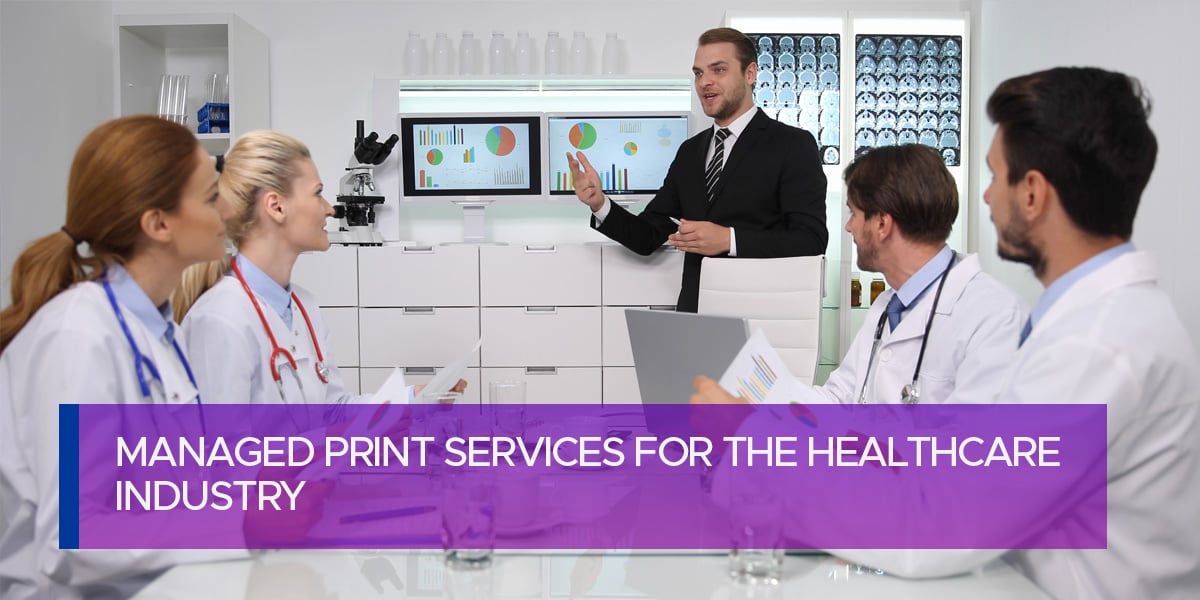
Managed Print Services for the Healthcare Industry
The healthcare industry is on the front lines during the COVID-19 pandemic. This includes hospitals, but also medical practices, health insurance companies, pharmaceutical makers, medical device manufacturers, and biotechnology researchers. While the pandemic is at, or near, its peak, the primary focus of all these industries is on providing patient care and finding ways to slow or stop the transmission of COVID-19.
As a result, some essential business functions have taken a back seat to treat patients. For example, managing and maintaining printing equipment is critical to the functioning of the healthcare industry but is a distraction when hospitals are overloaded with patients.
What Can Managed Print Services do for the Healthcare Industry?
When a business cannot devote human resources or attention to its printing equipment and consumables, it can outsource those tasks to a managed printing services provider. The medical industry is heavily dependent on printing equipment and consumables and is a perfect candidate for managed print services.
Printing is Essential to the Healthcare Industry
The U.S. government has been encouraging healthcare providers to shift to electronic medical records since 1996. In fact, three of the most significant healthcare laws passed since over the past 25 years addressed paperless medical records:
- Health Insurance Portability and Accountability Act of 1996 (HIPAA): HIPAA set the national standard for protection and privacy of electronic health records (EHR).
- American Recovery and Reinvestment Act of 2009 (ARRA): The stimulus bill passed after the housing crash of 2008 and included stimulus money for the healthcare industry on the condition that it be used to adopt EHR.
- Affordable Care Act of 2010 (ACA): The ACA mandated the adoption of EHR for healthcare providers, including health insurance companies, participating in the ACA.
As a result, most healthcare providers have at least a basic EHR system. As of 2017, 85.9% of healthcare providers had adopted some form of the EHR system.
Despite this adoption rate, most healthcare providers continue to rely on printing. About 90% of healthcare providers still print and mail paper bills. Moreover, physicians resisted going completely paperless because they felt that the EHR is unreliable and a computer terminal in the examination room interferes with the doctor-patient relationship. Similarly, healthcare providers often use paper to collect signatures to document a patient’s “informed consent” to medical procedures because the burden of verifying e-signatures creates legal exposure for the healthcare provider.
As a result, many medical providers still use paper for:
- Intake forms
- Financial responsibility records
- Informed consent documentation
- Cost estimates
- Billing and receipts
- Correspondence with patients and insurance providers
- Backup files to EHR
Managed Print Services for Healthcare Providers
Healthcare providers’ needs for printing services has not diminished with the pandemic. On the contrary, some hospitals have been overwhelmed and others are preparing for an expected rush of patients. With more patients, an influx of printing will be required to collect information, document cases, and correspond with insurance providers.
Now, more than ever, healthcare providers need to outsource print management. Managed print services providers perform many tasks including:
- Assessment: Measure a healthcare provider’s current printing usage and need.
- Policy development: Create a printing policy to meet needs while reducing waste and inefficiencies. For example, simple changes like the number of employees sharing printers can shift lightly used equipment to relieve overburdened equipment.
- Management: Manage the inventory of consumables to ensure they meet the business’s demand without the burden of idle inventory.
- Service: Maintain, service, and repair print hardware.
- Replacement: Replace obsolete hardware that does not meet the business’s needs.
- Monitoring: Track print usage to identify additional waste or inefficiencies that can be eliminated through further management and policy changes.
Benefits of Managed Print Services in the Healthcare Industry
Managed print services have many benefits for healthcare providers, including:
- Free up employee time: During the current pandemic, healthcare companies have experienced a staffing shortage. This is partly due to the increased demand for healthcare services and partly due to the absenteeism of staff exposed to coronavirus. Outsourcing print services can free up office staff for essential duties.
- Manage costs: Managed print services provide stable and predictable costs while containing waste.
- Match technology to needs: Print managers can ensure that equipment performs all the necessary functions, without including unnecessary functions that may drive up equipment prices.
Expert Managed Print Services for Healthcare Businesses
Managed print service providers are experts in business printing. These professionals lend their expertise to healthcare businesses to improve efficiency and productivity.
During the current pandemic, healthcare businesses are experiencing historic demands. Hiring a managed print service provider can relieve hospitals and medical providers of the important, but non-medical, print management tasks.
Contact us to discuss how managed print services can assist your healthcare business.
